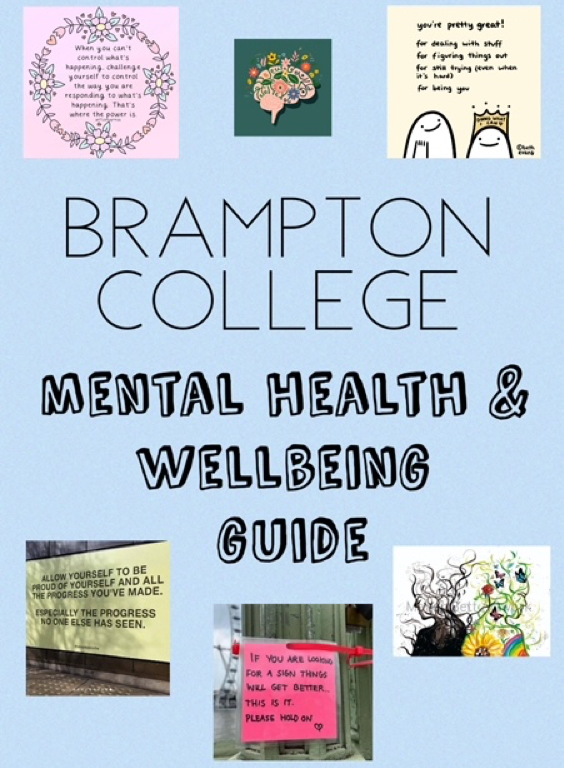This week, in one of the ways the college is participating in mental health awareness week, the new Brampton College Mental Health and Wellbeing Guide has been released to students and staff via Google Classroom. Paper copies were handed out at the fidget toy and bake sale event on Wednesday (more information to come soon about this fantastic event!).
The comprehensive booklet made by myself (AS co-wellbeing ambassador), with some ideas contributed by Ava Grossman (AS co-wellbeing ambassador), is aimed at providing students with information to be able to develop effective coping strategies to deal with any mental health or wellbeing challenges, particularly given all the stresses that come with doing A levels, such as exam stress.
The booklet comprises of eight sections. The first section – help and support at college – lists the different people at college to support students’ wellbeing, who are always available for students to talk to, as well as their contact details or where to find them. This includes: Personal Tutors, our counsellor Barbara Hynes, our Welfare officer, the three safeguarding/ deputy safeguarding leads, and more.
The second section (my personal favourite) – personal tools to help cope with stress and anxiety – offers a detailed list of 21 different strategies that can be used, in moments of distress, as coping mechanisms, including links where relevant. Some examples include engaging multiple senses at once as a grounding tool, making a ‘reality check-list’- a list of all the objective facts about yourself and the world around you; a change of temperature eg. dunking face into a bowl of ice water; and creating your own ‘wall of positivity’, a wall or poster of post-it-notes with various quotes that inspire you to keep going.
The third section – general wellbeing tips – offers a list of 15 detailed general strategies to maintain good mental wellbeing, and even how these can be adapted when struggling. The fourth section offers a list (with links) of online mental health support resources; the fifth suggests a variety of helplines to call/message in a mental health crisis; and the sixth a few other crisis support suggestions.
The seventh section – your friend is struggling, what should you do?- provides a guide for students about how to respond when a friend comes forward to you about struggling with mental health, some warning signs to look out for and how to approach starting a conversation with a friend who you think might be struggling. As well as some reminders for you, the friend, about creating boundaries when needed, and most importantly to always come forward to a trusted adult (perhaps including the staff available at college) if you feel your friend might be at risk.
Finally, I have included a section about reducing the stigma around mental health, with a specific focus on the importance of stopping the use of mental health terms used incorrectly in colloquial conversation. If you are interested in this, stay tuned for the next article, which will be an extract from this section of the booklet!
In my – well, perhaps slightly biased – opinion, I would highly recommend students check out this new resource, or at least the parts you are most interested in (clicking on the specific title in the contents page will take you straight to the section!). Psychology, and mental health awareness, education and support is my passion, and I really hope that by sharing some of the things I have found helpful or things I have learned, with others, this booklet can help maybe even just one person who is struggling, or anyone looking to improve their mental health and wellbeing. Or perhaps to gain a deeper understanding about mental health.
You never know, you might find something in there that makes maintaining good mental health as an A level (or GCSE) student just a little bit easier to cope with.
By Sophie Lunzer, student




